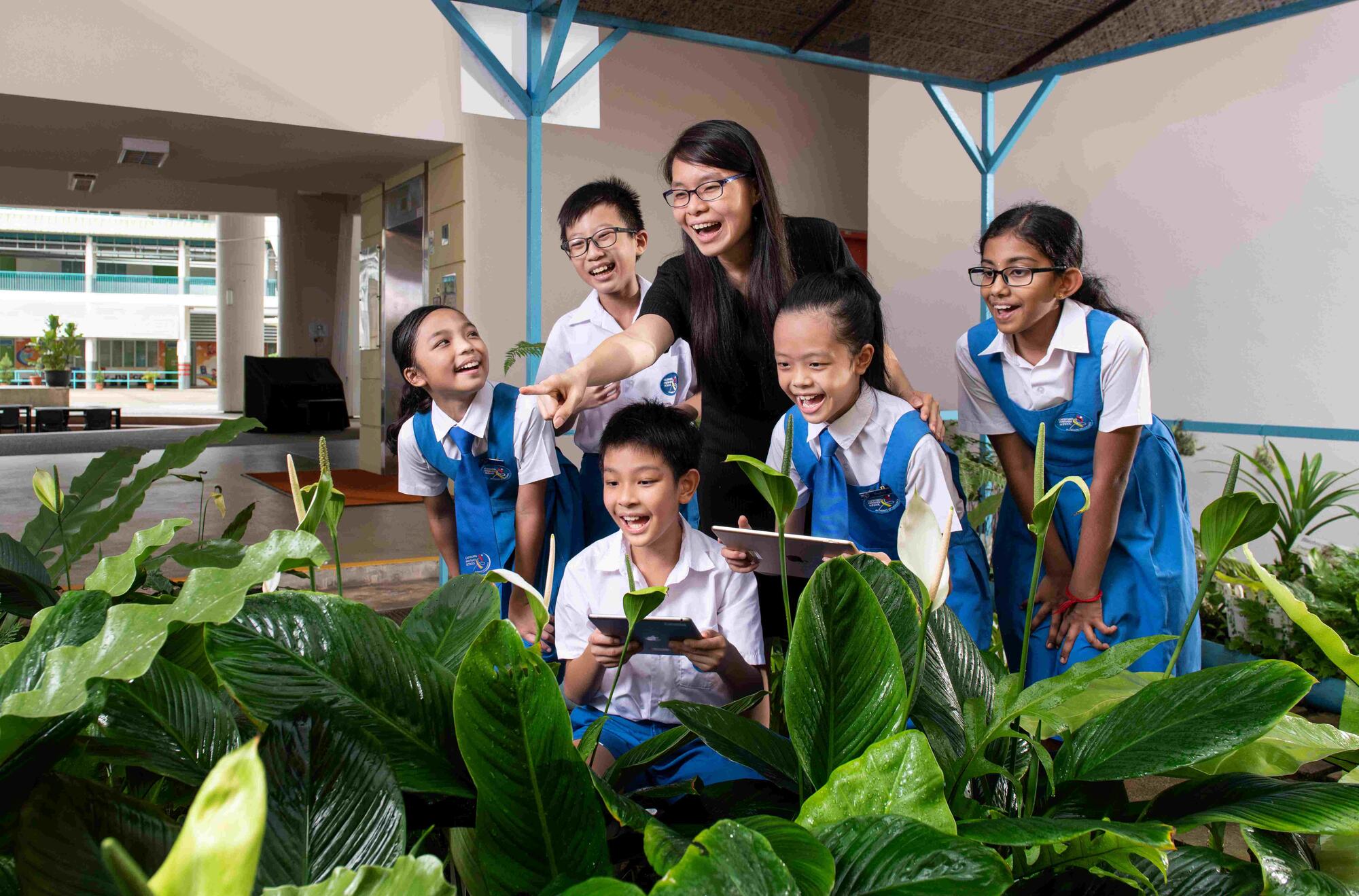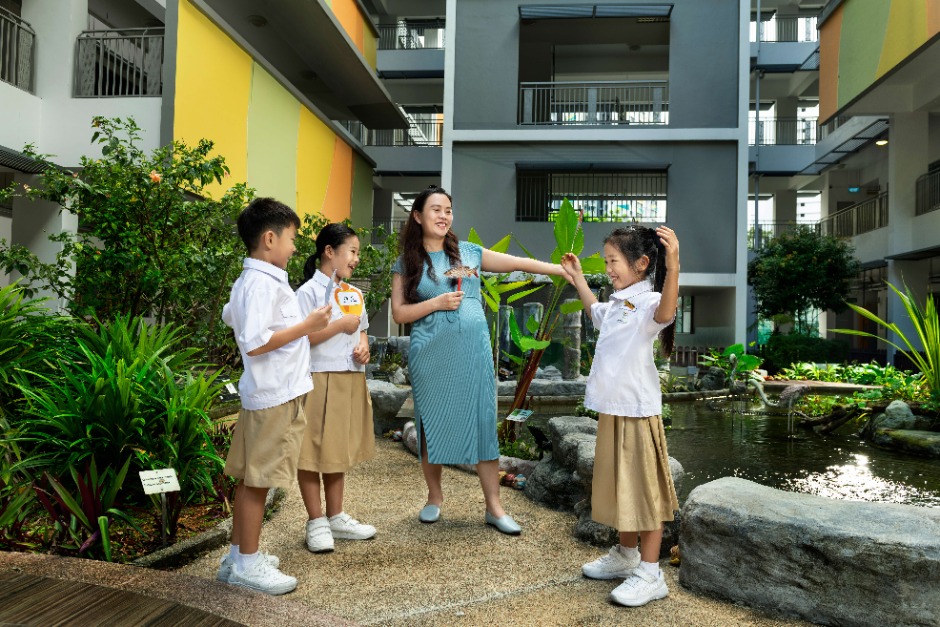Words, Sounds and Books Give a Boost to Literacy
03 Apr 2008
The word “television” is taped on the TV set, and around the living room, you see identification labels with “sofa”, “book shelf”, “window” and “curtains”. Step into the kitchen and there are more labels for “dining table”, “refrigerator”, “larder” and so on.
This is Tim’s home and today he’s able to rattle off each name easily. But the situation was very different when he first entered Pri 1 a year ago. Then, he could barely read, and would stare in silence when a flash card was shown to him.
How did Tim improve his reading skills so quickly?
One big factor: the help of MOE’s Learning Support Programme (LSP) at Yangzheng Primary School. The LSP is part of MOE’s efforts to level up opportunities for Pri 1 pupils who have weak literacy skills. These pupils, identified at the start of the school year, receive additional help through the LSP so that they can catch up. After a year in the LSP, Tim achieved a reading age on par with his chronological age, and was successfully discharged from the programme.
“Yangzheng Primary was a pilot school for the programme,” says Mrs Stella Foo, one of the school’s two LSP coordinators. “In 2006, we had 10 pupils in our LSP pilot group. Three were discharged when they passed their second-semester English Language exam and attained age-appropriate reading age (twin criteria set by MOE), while another four were discharged in Pri 2.”
The school enhances literacy among its pupils by encouraging a “print-rich environment,” says Mrs Foo, “something parents can do at home too.” Besides classroom teaching, parent volunteers called “Reading Mums” visit the school twice a week to read to the weaker pupils, and the Buddy Reading Programme pairs a strong Pri 2 reader with a weak Pri 1 or Pri 2 reader. They meet twice a week for half-hourly reading sessions where they take turns to read out loud. The school has also tapped on the Southeast CDC Edu-Bridge grant to engage a phonics instructor for some of the pupils in the LSP group, a project that spanned 20 sessions.
“Support from parents is very important to develop pupils’ literacy from a young age,” says Mrs Foo, herself a mother of two. She shares her experiences and provides tips on how parents can help their kids by providing the right home environment to encourage learning.
“For reading, it’s good to have a conducive setting – an airy, comfortable and uncluttered place (to minimise distraction),” she advises. “Try to set aside the same time on a regular basis so the child knows what to expect.”
Parents should be encouraging: “motivate the child, praise him, and try to instil a love for the written word when they are young. Try different genres – poems, stories, short novels – so that kids are exposed to the diverse way that words are used,” she suggests.
The reading period should be short because children have short attention spans. “About 15 to 20 minutes for Pri 1 or younger would be good, followed by some related activities. You can talk about the story, ask your child for his reaction to the character, storyline, place or event. He can draw certain scenes or pictures, or add captions to the pictures.” Mrs Foo also suggests asking comprehension questions or picking out new words to teach vocabulary – in a nutshell, “vary the activities”.
Parents can also engage in word games such as Boggle, Scrabble and Upwords with their young ones, or invent their own games. “A convenient and fun game my kids enjoyed when they were younger goes like this – we take a long word, and we challenge each other to see how many different words we can form using the letters found in this long word.”
In daily life, there are also many opportunities to engage the child and reading is inadvertently involved for many activities. “When watching a TV programme, talk to the child and ask him to respond to what he sees. When crossing the road, you can educate him about the traffic signals; at the supermarket, you can refer him to the food labels,” Mrs Foo elaborates.
For parents who are not equipped with the resources or skills, Mrs Foo recommends turning to educational CDs and tapes. “These learning kits usually come with an audio or audio-visual tape, and a workbook. The pupil can play the tape on his computer or cassette/CD player, and work on the assignments and tasks.” Yangzheng Primary School has also developed similar kits for pupils to use at home as a form of reinforcement.
Want to know more? Here’s a ten-step list of recommended reading strategies provided by the Learning Support Coordinators of Yangzheng Primary School, to better improve your child’s literacy skills.
A 10-step guide to improving literacy
- Provide a conducive place for your child to read that is well-lit, cool, airy and uncluttered. Try to avoid all distractions.
- Keep reading sessions frequent and short to sustain the interest of your child.
- Stock up on books that interest your child in places where they can be easily accessed. As your child becomes a better reader, add a variety of more challenging books to your collection.
- Help your child to identify and separate the phonetic sounds in words. Get him to look out for beginning and ending sounds, and put separate sounds together.
- After each reading session, ask your child several simple comprehension questions to guide his reflection on what he has just read. Ask him to summarise the content of what he has read or ask about new words encountered. You can even ask his opinion of characters, places, and events from the book.
- Engage in multimedia software. Have books on tape in your home. Get your child interested in listening to audio recordings of rhymes and stories.
- Record your child’s reading on tape, play it back and allow your child to see how he has read and can further improve his reading. At all times, be encouraging, positive and nurturing.
- Remember to engage in different text types, e.g. poems, stories, jingles, rhymes etc.
- Word games are simple, fun and effective ways to boost child literacy. Engage in crossword puzzles, word searches, anagrams and impromptu spelling bees!
- Plan a field trip to the library. Contact your local library to arrange a guided tour that explains how your child can use the library. Update yourself on the library’s range of services for young children. Enquire about bilingual story times, special story hours or programmes for children, as well as workshops for parents and care-givers.







.jpg)
